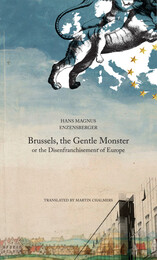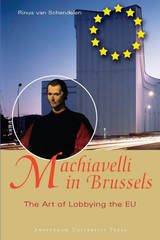3 books about Brussels

Brussels, the Gentle Monster
or the Disenfranchisement of Europe
Hans Magnus Enzensberger
Seagull Books, 2011
The inner workings of the European Union are as much a mystery to those living within its confines as they are to those of us who reside elsewhere. The Brussels bureaucracy that sets many of the EU’s policies feels remote to its citizens, yet the influence of its decisions can extend worldwide and throughout the global marketplace.
In this timely and insightful essay, Hans Magnus Enzensberger blends reportage, argument, and analysis in order to make sense of the EU’s present political and economic roles and examine the EU’s origins and inherent contradictions. In Enzensberger’s view, Europe is involved in a project without precedent—the first non-violent form of post-democratic governance, which is trying to abolish the diversity of Europe and impose a regime that is not accountable to its citizens. Its often bizarre and arbitrary rules amount to a soft but relentless guardianship, dictating how half a billion people should live their lives regardless of their own political opinions and traditions. Enzensberger here offers a strategy for approaching this modern monster—at once gentle and giant, friend and foe.
Praise for Enzensberger
“How should one cope with Germany? Let’s ask Hans Magnus Enzensberger. . . . One can only marvel at his permanent alertness, his tone of cold enragement, the dimensions of his hunger for experience, most of all however, one can only marvel at his sense of important issues. For 50 years, time and again Enzensberger has posed the right questions to German society. . . . No one should ever believe Enzensberger is on his side. Whenever someone makes a clear distinction between Good and Evil, Enzensberger will jump out of his cover and shout: It’s not that simple.”—Florian Illies, Die Zeit
[more]

Machiavelli in Brussels
The Art of Lobbying the EU
Rinus van Schendelen
Amsterdam University Press, 2002
Countless interest groups representing governments and civil societies try to lobby the European Union effectively in pursuit of the desired legislation, subsidies and more. This book describes the everyday practice of lobbying in Brussels, drawing on extensive research and the author's personal experience.
The objective of these interest groups is to influence the EU decision-making, of which they see themselves as a stakeholder. To the existing representative bodies such as the Parliament and the Council, they add their practice of lobbying for a desired outcome by making their interests present or represented at the EU level. In a roundabout way, they contribute to the EU integration and also to its democracy, so long as the following conditions are fulfilled.
The objective of these interest groups is to influence the EU decision-making, of which they see themselves as a stakeholder. To the existing representative bodies such as the Parliament and the Council, they add their practice of lobbying for a desired outcome by making their interests present or represented at the EU level. In a roundabout way, they contribute to the EU integration and also to its democracy, so long as the following conditions are fulfilled.
[more]

Urban Regimes and Strategies
Building Europe's Central Executive District in Brussels
Alex G. Papadopoulos
University of Chicago Press, 1996
If a city based its planning decisions on the needs of an international bureaucracy rather than on the traditional needs of local residents and businesses, how would that city change? How might it look?
In Brussels, Belgium—since 1957 home to the European Union—such change is taking place. Observing the change, Alexis G. Papadopoulos explores a new geographical concept, the Central Executive District. This urban form is significantly different from the Central Business District, its conventional counterpart. Drawing on game and rational choice theories, spatial analysis, and land economics, the author analyzes how the landscape of the city's center has evolved over the last three decades under the influence of successive coalitions of local and foreign elites. He describes how foreign diplomats, international corporate executives, and real-estate developers cooperate with one another to carry out major urban projects in the face of resistance from local neighborhood groups, conservationists, and political factions.
This study makes a substantial contribution to geography and urban studies both for its implications about the future of world cities like New York, London, and Paris and for its original application of the notion of cooperative regimes.
In Brussels, Belgium—since 1957 home to the European Union—such change is taking place. Observing the change, Alexis G. Papadopoulos explores a new geographical concept, the Central Executive District. This urban form is significantly different from the Central Business District, its conventional counterpart. Drawing on game and rational choice theories, spatial analysis, and land economics, the author analyzes how the landscape of the city's center has evolved over the last three decades under the influence of successive coalitions of local and foreign elites. He describes how foreign diplomats, international corporate executives, and real-estate developers cooperate with one another to carry out major urban projects in the face of resistance from local neighborhood groups, conservationists, and political factions.
This study makes a substantial contribution to geography and urban studies both for its implications about the future of world cities like New York, London, and Paris and for its original application of the notion of cooperative regimes.
[more]
READERS
Browse our collection.
PUBLISHERS
See BiblioVault's publisher services.
STUDENT SERVICES
Files for college accessibility offices.
UChicago Accessibility Resources
home | accessibility | search | about | contact us
BiblioVault ® 2001 - 2024
The University of Chicago Press









